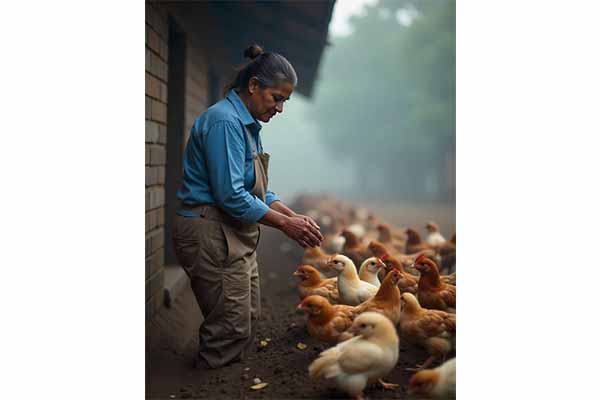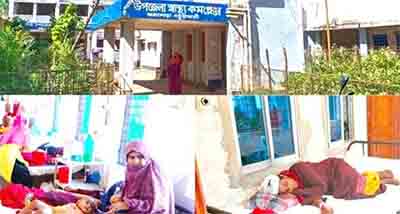
Bangladesh has made remarkable strides in women empowerment, driven by a combination of government policies & activities, NGO initiatives, and the resilience of Bangladeshi women themselves. However, continued efforts are needed to address remaining challenges and ensure full gender equality, said a press release jointly issued by Bangladesh Poultry Industries Central Council (BPICC) and U.S. Soybean Export Council (USSEC).
The press release said, there is a complex reality for many women in Bangladesh. While they are indeed making significant contributions to their families and the nation economy, they continue to face systemic barriers that limit their full enjoyment of their rights. Bangladeshi women shoulder a disproportionate burden of unpaid care work, including childcare, elder care and household chores. These works are often invisible and undervalued, yet they are essential for the functioning of families and communities.
While women are vital to sectors like the RMG industry, they often work in precarious conditions with low wages and limited control over their earnings. Even when women are involved in agricultural work, they frequently lack ownership of the land they cultivate. Patriarchal social norms and discriminatory laws continue to restrict women access to resources, opportunities, and decision-making power. Issues like child marriage, dowry-related violence, and limited inheritance rights further undermine women autonomy. BPICC recommended reforming discriminatory laws and ensuring their effective enforcement, promoting gender equality through education and awareness campaigns, providing women with access to education, skills training, and financial resources.
In a message Shamsul Arefin Khaled, president, BPICC praised highly for the success and contribution of women, especially in the society. He said, we have to acknowledge women contribution as without them no society can exist. Recognition helps to build confidence and self-esteem, motivates women to continue striving for excellence and to take on new challenges. He said, growing numbers of women are pursuing higher education. Women are increasingly active in political movements and advocating for their rights. They are actively participating in social movements and challenging traditional gender norms.
A.T.M Mostafa Kamal, secretary, BPICC said, Bangladesh Government has established separate ministry named Ministry of Women and Children Affairs and a directorate named Department of Women Affairs more than three decades ago for the wellbeing of women in Bangladesh. Kamal said, Millions of women are working in the ready-made garment industry, which is the dominant force in Bangladesh export economy. Increased participation of women in small and medium enterprises (SME) including poultry and livestock, helping Bangladesh towards progress. “Women represent 40 percent of the workforce in the poultry sector, making it possible to produce affordable protein for all”, added Kamal.
In a separate message, nutritionist and dietician Israt Jahan said, on Women Day, it is a great time to focus on promoting healthy lifestyles for women. Ensuring adequate protein intake, including sources like egg, milk, meat, fish, soy and other plant proteins like legumes, nuts, seeds, etc. can support women overall well-being throughout their lives. She said, over half of women of reproductive age are not achieving the minimum dietary diversity essential for their health, while a staggering 70 percent of non-pregnant, non-lactating women face multiple micronutrient deficiencies. These alarming statistics highlight a critical issue: the health of women is at stake, with significant consequences that extend to their future children. Insufficient nutrition not only increases the risk of low birth weight and maternal anemia but also contributes to lasting health complications for newborns. It is imperative that we address these deficiencies to ensure a healthier future for both women and children.
Referring to a study conducted by U.S. Soybean Export Council (USSEC), Khabibur Rahman, Team Lead-Bangladesh, USSEC said, myths and misconceptions persist among Bangladeshi consumers despite high-awareness of animal-based sources. Besides, inadequate knowledge of the nutritional values of plant protein sources also exists. Kabibur said, the awareness of protein requirement across the life cycle is poor and a significant gender disparity is noted about protein requirements of pregnant/lactating women. Only half of Bangladeshi citizens are aware that pregnant and lactating women have higher protein requirements.
BPICC sources said, on the occasion of International Women Day 2025, it is important to look at both the overarching global themes and the specific needs of women in places like Bangladesh. We have to ensure equal rights, power and opportunities for all, and create a world where no one is left behind.

The 50-bed Kalapara Upzila Health Complex under Patuakhali district has been plagued with various crises which led to a severe disruption to the medical services.
Patients coming to the hospital are being deprived of proper medical services and the admitted patients to the hospital are making numerous complaints about quality of food, cleanliness and hygiene.
It has been seen on the spot that on an average of 300-350 patients coming to the outdoor of the health complex every day for medical services. Only three-four doctors working in the hospital cannot provide required medical services to this number of patients.
Patients are being forced to receive medical services at the chambers of the physicians instead of the hospital due to insufficiency of doctors. As a result, the sufferings of poor and helpless patients are endless. Similarly, the pressure of the admitted patients is also very high.
The number of admitted patients is more than the beds. There are only 11 doctors working in the upazila headquarters, including Kuakata and Mahipur.
The upazila health administrator has to be busy with various administrative tasks most of the time. Out of these, one doctor is on deputation to Patuakhali. However, there are 36 physicians posts in the upazila.
In Kalapara upazila headquarters, only four doctors are handling the medical services of 300-350 patients daily in the outdoor department. So that it is not possible to give appropriate time to the patients.
Due to the shortage of doctors, it is difficult to manage the emergency department. Similarly, 76 posts of employees are also vacant. The problem seems to be endless.
JH Khan Lelin, Resident Medical Officer of Kalapara Upazila Health Complex, said that in addition to Kalapara Upazila, numerous patients from neighboring Amtoli, Taltoli, and Rangabali Upazilas are constantly receiving medical services in this hospital.
“The shortage of physicians needs to be resolved. And the contractor has been warned many times about the quality of food. Action will be taken soon," he said.
Cleaning work has to be done with outsourced manpower. It is known that the hospital has the opportunity to conduct numerous tests including typhoid, hepatitis B-C, pregnancy, kidney, jaundice, sickle, AIDS virus, X-ray, diabetic at a low cost.
But patients complain that some doctors send them to their own preferred clinics for tests. However, patients get several medicines free of cost. But since June last year, patients are being deprived of medical services as the contractor has not supplied some essential medicines for pathological tests.
There are complaints from patients about the cleanliness of the hospital bathrooms and toilets. Some nurses, nannies, and cleaners have been heard of misbehaving with patients.
There have been widespread complaints about the quality of food served to the patients. A patient admitted to the women ward said that she was admitted four days ago. She is getting some medicines from the hospital. She also has to buy some from outside.
She also said that she was given bread and a banana in the morning. A boiled egg cooked with potatoes is given at night and noon. This is how it goes most days.

Experts have highlighted that the newly developed training on the trainers manual plays a crucial and effective role in ensuring mental health support and improving the quality of life of street children.
They came up with the observation at the closing ceremony titled Presentation of Research Outcomes: Mental Health of Underprivileged Children in Dhaka City held at the Bishwo Shahitto Kendro auditorium in the capital today.
Key speakers at the event included Ekmatra Society Executive Director Shubhashish Roy, Director Dr. Niloy Ranjan Biswas, Additional Deputy Commissioner for Development and Human Resources Shamim Hossain, Toyota Foundation Representative Naomi Okiyama, and Very50 CEO Ryosuke Sugaya, a press release said.
The speakers shed light on the mental health challenges faced by underprivileged children, calling for collective efforts to address these issues.
Following the speeches, a discussion session on the research findings was held, where Prof. Mahjabin Haque from Dhaka University Department of Educational and Counseling Psychology and Farhad Hossain, Founder and Executive Director of the Local Education and Economic Development Organization (LEEDO), shared their insights.
The session included screenings of two documentaries titled What is Trauma? and PTSD, which explained the impact of trauma and post-traumatic stress disorder on children.
The event concluded with testimonials from beneficiaries and their mothers, who shared their experiences of living on the streets and how their lives changed with the help of Ekmatra Society.
According to UNICEF 2024 survey, the number of street children in Bangladesh has risen to 3.5 million, 70 percent of whom live on the streets of Dhaka. Despite being a common sight on the city bustling roads, the struggles of these children often remain unseen.
Neglect, abuse, and the traumas of their present and past lives are their daily companions, pushing them toward an unbearable existence. These struggles leave deep emotional scars, often leading to post-traumatic stress disorder (PTSD). To escape these traumas, many children turn to dangerous paths for temporary relief.
While basic needs such as shelter are prioritised, the mental health of street children remains overlooked and neglected. Caregivers at shelters often lack the necessary knowledge and skills to address the mental health needs of these children. The absence of adequate research on their mental health challenges further complicates understanding their needs and providing appropriate support.
To address this gap, Ekmatra Society and Very50, with funding from the Toyota Foundation, jointly conducted a research project titled Mental Health of Underprivileged Children in Dhaka City.
This study, which began in 2023, was based on the experiences of 80 street children and 20 caregivers. Data was collected through case studies involving conversations with street children, facilitated by child psychologists and research assistants.
Following the case studies, the research team collaborated with psychologists and stakeholders from organisations directly working with street children to conduct key informant interviews and focus group discussions (FGDs).
Based on the findings, Ekmatra Society developed the Training on Trainers Manual, designed to guide caregivers at existing shelters for street children. The manual aims to equip caregivers with skills to provide preliminary care to children suffering from PTSD.
Additionally, two documentaries were created to illustrate the mental health challenges of street children, highlighting the effects of trauma and PTSD and presenting expert opinions on these issues.

Today, with 150 million startups worldwide and another 50 million launching each year, innovation and creativity are reshaping industries. However, roughly 1 in 5 startups fail in the first year because of a variety of difficulties, from financial struggles to poor product-market fit. Recognizing this, OPPO actively engages with startups, providing essential support to help them navigate obstacles and bring their innovations to fruition.
"At OPPO, we understand the diverse needs of startups. We offer comprehensive support, including funding, technology, and marketing, to foster their growth and extend the benefits of technology to more people. Through these strategies, startups such as AlpsenTek, HUAYI, and CloudSteth are expected to apply their innovations to real life," said Yan Ren, Director of Open Innovation Europe, OPPO. "As AI has become one of the most promising areas these days, OPPO is actively entering this space and seeking further collaboration with startups to unlock new possibilities with AI."
Go beyond investment
To be successful, startups need more than just an idea. AlpsenTek, specializing in machine vision, leveraged OPPO financial and technical support to integrate its cutting-edge hybrid vision sensor ALPIX-Eiger® with AI algorithm capabilities. Leveraging Qualcomm Snapdragon® Mobile Platforms, OPPO led the development of a set of AI Motion algorithms that can process the information from sensor to de-blur images and help users capture true-to-life moments on the fly. This has helped AlpsenTek leading technology has the ability to be applied to smartphones and given it the chance to further drive AI-related innovation for both sides.
As OPPO has been investing in XR, another startup – DeepMirror – has joined OPPO innovation networks. To help the company be quickly recognized by the industry, OPPO invited DeepMirror to showcase its latest AR game at the global stage, MWC24. Powered by its cloud-based service, MirrorVerse, visitors can interact with real environments inside games, adding more fun to the experience.
Co-create to drive disruption
To cultivate new technologies, co-creation is the name of game. Whether for a big company or a startup, co-creation provides both parties with a way to make one plus one sum to something more than two.
A good example of this kind of R&D partnership is with one of our startup friends, HUAYI Medical Technologies. Founded in 2021, HUAYI is a high-tech startup that is specializing in contactless health monitoring technology and products. The company core technology solution is called "WonTrackR," which combines millimeter wave technology, radar/physiological signal processing and reconstruction, and AI modeling. Unlike the cold, mechanical medical equipment of old, a device featuring WonTrackR can be placed anywhere at home to monitor various health metrics, taking care of family members in a warm and unintrusive way.
Another example is CloudSteth. CloudSteth intelligent auscultation system can automatically analyze heart and lung sounds through AI to help children with pneumonia, asthma, and congenital heart disease get diagnosed earlier and receive the medical treatment they need sooner. Through close cooperation with leading hospitals in China, the company has accumulated rich experience in medical treatment.
Drawing on long-term empowerment
For OPPO, empowering startups is not a one-off, but a part of its permanent mission. Initiatives like the OPPO Inspiration Challenge provide startups with ongoing support and global recognition opportunities.
For example, OPPO worked together with Tangtangquan to implement its digital therapeutic solution on the OPPO Watch 3 and 4, which has so far helped more than 20,000 users to monitor their blood glucose and manage their health more conveniently. In December 2023, OPPO invited Bluepha Co., Ltd to showcase its green material alternative to plastic - Bluepha™ PHA- to a global audience during COP28. The material was crafted into the phone case for OPPO Find N2 Flip, proving its potential for commercial use in the future.

